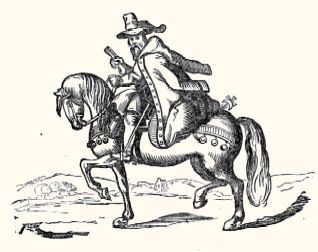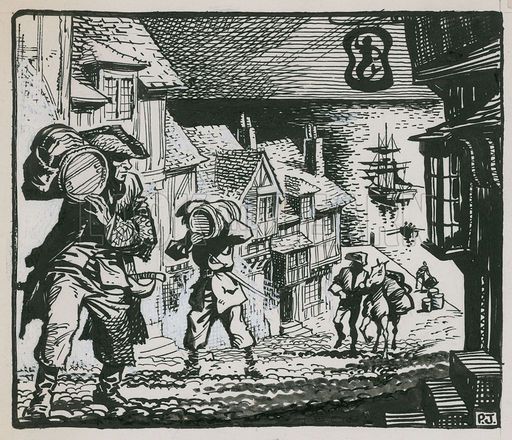Flashing Blades is a marvelous game but it does have one notable imbalance – while noblemen, gentlemen and soldiers have a a lot of support in careers the guttersnipe ‘rogue’ background has no such support in the rules. This seems a little unfair, and even thinking back to the when I played the game as a teenager the rogue class never got much of a look in.
As my current campaign has a Rogue in the form of Antoine I thought it best to give him such a structure. I have steered away from the moral unpleasantness of running bawdy houses and focused on crimes which feature opportunities for adventure hooks and drama without such tawdriness. I have also chosen to use the King of Thieves who features in the ‘Man behind the Mask’ scenario we have run.

A rogue making money from criminal activity can either:
- be Affiliated the character pays his dues to the King of Thieves, making the income as per the table below but they can accrue criminal rank and only risk detection from the authorities.
- be Freelances the character is not party to the King of Thieves’ organisation and makes three times the money displayed on the table below but must roll an additional roll for detection every month from the King of Thieve’s agent.
Unusually income is based on months – and each month a perpetrator must roll for detection by victim or the authorities and if Freelance also by the King of Thieves, This is done as a skill check which if failed (automatic on a natural 20) results in a combat encounter I will discuss on the relevant table. A criminal pc may surrender on detection (or if wounded, knocked out by opponents) and subject to trail as per page 44-45 of the rules.
If the same criminal activity is carried out for more than one month in the year each time it is repeated the following month is the detection check is reduced by 1.
If the criminal is a master in any skill they may only make one detection roll for each the victim/authorities and the King of Thieves a year no matter how many they carry out the crime. A master superior may only roll for detection from the authorities or the king of thieves (and if affiliated need not roll for detection at all.)
| Criminal Occupation | Earnings ( a month) | Chance of detection (a month) | Pre-Requisites |
| Cut-Purse | Cut-pursue+ Luck x 2d6 | Check v Cut-Pursue + ½ luck | Cut Purse |
| Burglary | Fine Manipulation+Luck x 2d6 | Check v Fine Manipulation + ½ luck | Fine Manipulation |
| Highway Robbery | Horsemanship+Firearms x2d6 | Check v average horsemanship/firearms | Horsemanship, Firearms |
| Smuggling | Bribery + Luck x (1-5 depending on foreign commerce) | Check v Bribery + 1/2 Luck | Bribery |
| Contract Murder | Victim Social Rank x 50L | Check v Stealth – Victim Social Rank | Stealth |
| Underboss | 1d6 Hirlings | Yearly check v Captaincy + 5 | Criminal Rank 5, Captaincy |
| Boss | 6 + 1d6 Hirlings | Yearly check v Captaincy + 10 | Criminal Rank 10, Captaincy |
| Overboss | 12 + 1d6 Hirings | Yearly check v Captaincy + 15 | Criminal Rank 15, Captaincy |
Note other backgrounds (gentlemen, nobleman, soldier) can carry out crimes but they must be unaffiliated.
By way of explanation Smuggling does not necessary refer to international trade as France has many internal trade barriers. For ease though I shall use the Foriegn Commerce table from the banking rules on page 37 of the rules to generate a rating of ( very poor (1) to very good (5)) to inform the income from smuggling in a particular year.

Criminal Rank for every 500 L earned from a criminal career in a year (not adventures) 1 point of criminal rank is gained but is not permanent, so can ebb and flow as income raises and falls. It does not raise expenses or taxes like social rank. The King of Thieves rank have ‘pretentions’ titles which they indulge in and use with each other out of respect.
| Criminal Rank | Pretention | |
| 1 | ||
| 2 | ||
| 3 | Trooper | |
| 4 | Sergeant | |
| 5 | Lieutenant | Underboss |
| 6 | Captain | |
| 7 | Master | |
| 8 | Major | |
| 9 | Colonel | |
| 10 | Baron | Boss |
| 11 | Viscount | |
| 12 | Count | |
| 13 | Marquis | |
| 14 | Duke | |
| 15 | Archduke | Overboss |
| 16 | Grandduke | |
| 17 | Prince | |
| 18 | Grand Prince | |
| 19 | ||
| 20 | King of Thieves | Boss of Bosses |
If a criminal is detected by the authorities or the King of thieves roll on the table below.
| Detection Table | City Crime | Country Crime (Highway/Smuggling) | Murder | King of Thieves |
| 1 | A armed gentleman | A armed gentleman | A armed gentleman | 1d6 Thugs |
| 2 | A skilled armed gentlemen | A skilled armed gentlemen | A skilled armed gentlemen | 2d6 Thugs |
| 3 | 1d3 City Guards | 1d6 Coach Guards | 1d6 Thugs | 1d6 Swordsmen |
| 4 | 1d6 City Guards | 1d6 Dragoons | 1d6 Swordsmen | 2d6 Swordsmen |
| 5 | 1d6 Musketeers/Cardinals Guards | 2d6 Dragoons | 2d6 Swordsmen | Assassin |
| 6 | Something ingenious | Something ingenious | Something ingenious | Ingenious |
A armed gentlemen is a sword wielding man with initial player character level of skill.
A skilled armed gentlemen has expertise 14 with dueling weapons.
Thugs are club wielding bravos expertise 12 intending to give a PC a friendly beating (but might kill them in the process.)
Swordsmen have expertise 12 and armed with rapiers, longswords or sabers
City Guards are polearm armed heavily armoured and have their regimental skills to expertise 13 Dragoons have all their armour except helmets and have expertise 13 in firearms and cavalry style Musketeers/Cardinals Guards have regimental skills to expertise 15 and are in classic Dumas ‘light order’ of dueling weapons.
Assassin is expertise 17 in firearms and at least one dueling style. Also skilled in poisons and will potentially attack from ambush.
Ingenious Could be anything – savate trained nuns, a coach filled with gunpowder, you’ve just picked the pocket of a leper……
Advertisements Share this:





